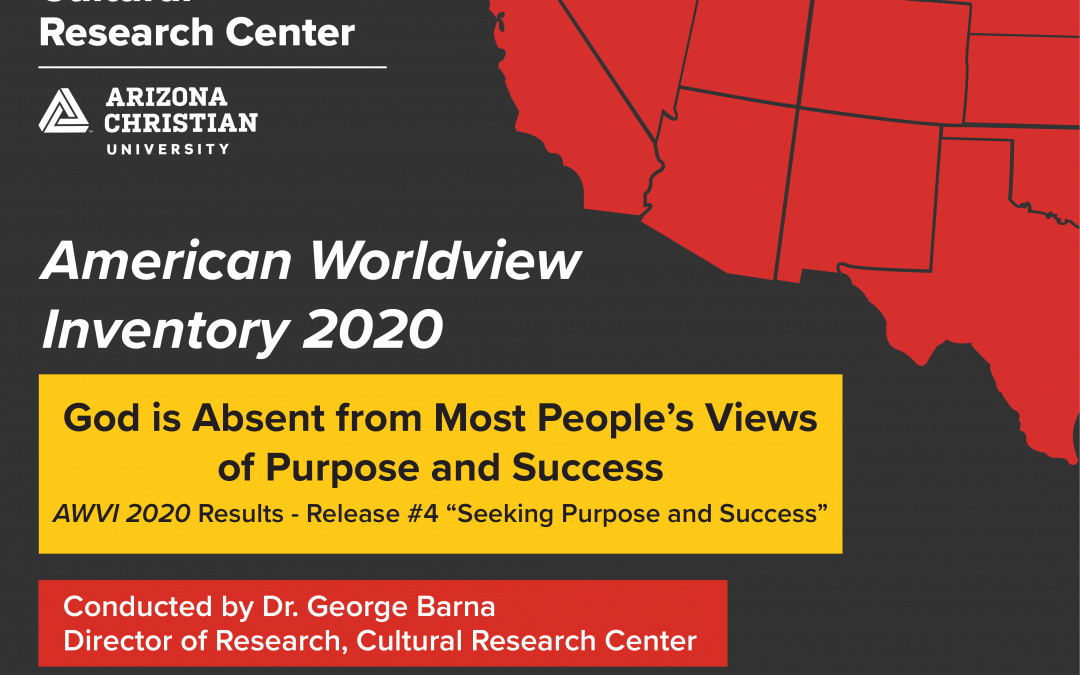By Dr. Tracy Munsil, Executive Director | Cultural Research Center at Arizona Christian University
An increasingly secular America insists that life has purpose and meaning—terms commonly associated with the historic Christian faith and biblical understanding—but doggedly refuses to include God as a possible route to finding either.
Ironically, our culture’s insistence on self-reliance and self-righteousness—to the exclusion of God—may make it impossible to fulfill our deepest longings to live a life of purpose and to experience success.
“The very thing that makes life fulfilling—knowing, loving and serving God—is no longer part of the cultural framework for how we live our lives,” explains ACU President Len Munsil. “We are running on the fumes of the biblical worldview, the framework that animated our nation’s founding, and provided meaning and purpose for generations of Americans before us.”
“As a nation, we have no hope of fulfilling our deepest yearnings for meaning and purpose without God,” Munsil explained. “This should fill us with compassion as the Body of Christ—because we see so clearly our nation’s great need for God’s truth.”
According to the latest study from the Cultural Research Center at Arizona Christian University, a whopping majority of 86% of Americans (six out of seven adults) believe there is a universal, shared purpose for human life, and two out of every three believe they have “unique, God-given calling or purpose.”
Yet few Americans make any reference to God or the Christian faith in defining what these terms mean. Even among the 71% of respondents who consider themselves to be Christians, fewer than 20% adopt the biblical view that our purpose is to know, love and serve God.
“The disconnect is staggering,” said Dr. George Barna, CRC Director of Research and author of the American Worldview Inventory 2020. “As a nation we long to understand our purpose and calling, ideas deeply rooted within our nation’s historical Christian faith and biblical understanding of God. Americans hold on to these basic biblical ideas of what makes human existence meaningful, yet, at the same time, we refuse to recognize reliance on God or His existence when talking about human success or purpose.”
Barna noted that most people pursue a life devoted to achievement, happiness, productivity, and striving for goodness. As he explained, “Those are not evil outcomes, but when they become the ultimate objective of life, you miss out on the greatest possibilities.”
Barna explained, “People who prioritize such outcomes miss the point that life flourishes when we become God-reliant rather than self-reliant. Being self-centered rather than dependent on God typically produces emptiness and disappointments, which in turn may lead to self-defeating choices such as substance abuse, broken relationships, loneliness, and even suicide.”
By rejecting God, said Barna, Americans today may be missing their opportunity to achieve the very things they long for most. “Millions of Americans misinterpret obedience to God to mean a life of limits, misery, and monotony. Yet those who pursue godly obedience report just the opposite. In fact, they are more likely to experience the very outcomes that most people are unsuccessfully pursuing through self-reliance and self-righteousness,” he said.
“Ironically, those who invest themselves in godly obedience are more likely than others to have lives that are healthy, safe, joyful, and free from oppressive burdens,” Barna explained. “Obedience does introduce boundaries, but those are limitations that God designed specifically for our success and well-being – boundaries that have proven to generate the life that most Americans have been looking for.”
Here are key findings from the latest AWVI 2020 report:
- The survey finds little consensus in how Americans define the purpose of life. The most widespread view, held by nearly one-quarter of adults (23%), identified “experiencing happiness and fulfillment” as the ultimate reason for living. Followed by “evolving to our full potential physically, intellectually, emotionally and spiritually” (18%); “knowing, loving, and serving God” (18%); “furthering the development of humanity” (10%) or “living a long, healthy life” (10%).
- The top definition of success was “living a healthy, productive, and safe life” (25%). One out of five adults selected either “being a good person” (22%) or “consistent obedience to God” (21%); 18% said “experiencing personal happiness or freedom.”
- Whether God is included as part of one’s life purpose differs sharply by age and political views. The older a person, the more likely they are to adopt a biblical view of life’s purpose. Conversely, the youngest (18 to 29) are least likely to include God. Political conservatives are three times as likely as political liberals to identify God as giving purpose to life.
- Among churchgoing adults, no Christian church affiliation claimed a majority who believed that success involved “consistent obedience to God.” Evangelicals came closest (47%), followed by those attending Pentecostal churches (42%), but only 23% attending mainline Protestant church and just 16% of Catholics include obedience to God in the definition of success.
The Cultural Research Center at Arizona Christian University exists to advance the Kingdom of God by conducting cultural and biblical worldview studies that will provide research and resources to inform and mobilize strategic engagement in cultural transformation. CRC’s biblical worldview research is used in developing resources for ACU’s CORE curriculum and supports the University’s vision of transforming culture with truth.
CRC’s latest AWVI 2020 report, “God is Absent from Most People’s Views of Purpose and Success,” is available here.

